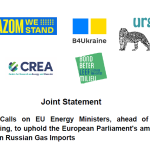WESTERN BALKANS
At COP30 in Belém, CAN Europe will advocate for more ambitious and fair climate policies in the Western Balkan region. The Western Balkans climate ambition is critical for the EU accession process, and ultimately affects Europe’s climate goals.
Nationally Determined Contributions (NDCs) 3.0 in the Western Balkans should be tailored to reflect both developmental priorities and capacity constraints, while advancing ambitious climate action. As comprehensive climate action plans, they should go beyond mitigation targets as the key element, and capture the wider purpose of policies and plans that would steer the transformation of our societies through climate-safe, just, equitable and sustainable pathways. They must also encompass adaptation and loss and damage measures, and address climate finance.
As countries in the region continue submitting their NDCs, at COP30 CAN Europe reiterates its call for clear, actionable and ambitious commitments that put people and communities at the heart of the energy transition. NDCs need to be developed in the strategic longer-term context of long-term strategies that are commensurate with near-zero global gross emissions by 2050 and with efforts to build resilience to anticipated threats posed by the changing climate.
CAN Europe calls on Western Balkan leaders to use COP30 as a turning point: to set a level ambition high enough to be credible to reach decarbonisation by 2050, establish a compatible coal-phase-out timeline, address climate impacts, plan for adaptation and resilience, and put people at the centre of the energy transition.
Read below CAN Europe’s detailed demands for COP30 for the Western Balkans, summarised as follows:
1. Raise climate ambition through credible and comprehensive NDCs
The Western Balkans must use the new NDC cycle to set ambition high enough to reach decarbonisation by 2050 including economy-wide absolute targets. NDCs should go beyond mitigation, guiding sustainable development, national investment, and just transition pathways. They must be coherent, transparent, and actionable, aligned with the Global Stocktake and the 1.5°C goal.
2. Plan a fast, fair fossil fuel phase-out
Coal still dominates the region’s energy mix. Governments must present credible energy transition plans to ensure net-zero electricity generation by 2040 – and stop subsidising new coal, oil, or gas projects. Public funds should be redirected to renewables, energy efficiency, and retraining programs, demonstrating that climate ambition is matched by tangible action.
3. Provide strategic and consistent long-term perspective
Climate, energy, and development planning must be coherent and aligned. NDCs 3.0 offer a 10 year perspective and must connect with National Energy and Climate Plans (NECPs) and long-term climate strategies, mapping clear, credible pathways for decarbonisation across all sectors. Coherence ensures ambition is translated into implementable policies.
4. Ensure coherence with National Adaptation Planning
Western Balkans are a climate and other natural hazard hotspot within Europe, so NDCs must deliver ambition on adaptation and resilience. Countries should ensure coherence with National Adaptation Plans where applicable or address the lack of NAPs and other adaptation strategies. Given the interconnected nature of the region’s climate and landscape, NDCs should reflect a regional adaptation perspective.
5. Deliver climate justice through participation, and accountability
A credible NDC process must be inclusive, participatory, and transparent. Governments must engage women, youth, and vulnerable groups, protect environmental defenders, and embed gender and social equity in all policies. Transparent tracking and reporting ensures that high ambition is matched by accountability and progress. The energy transition must work for and with citizens. Credible NDCs should embed citizen-driven solutions, such as community and citizen energy projects, as a central pillar.
6. Plan for adequate finance to respond to the needs
Given the limited domestic resources and investment needs, the Western Balkan Six should provide an assessment of the economic and financial costs and benefits of achieving the NDCs targets. They need to present financing strategies to meet the targets and identify potential domestic funding sources, or accompanying policy reforms. Western Balkans NDCs should also plan the access to international climate finance.
TÜRKİYE
At COP30 in Belém, CAN Europe will advocate for ambitious and just climate policies in Türkiye, ensuring the country’s new Nationally Determined Contribution (NDC) for 2035 reflects science, fairness, and sustainable development.
Read below CAN Europe’s and Türkiye’s Climate Network detailed demands for COP30 and summarised as follows:
1. Set science-based and ambitious GHG reduction targets
Türkiye must adopt 2035 emission reduction targets aligned with the 1.5°C goal and its 2053 net-zero pathway. Targets should be transparent, realistic, and sector-specific, covering energy, transport, industry, agriculture, and forestry.
2. Plan a fast, fair fossil fuel phase-out
Türkiye must announce coal phase-out dates for electricity and industry, end fossil fuel subsidies by 2030, and halt new coal, gas, and oil investments. Public funds should be redirected to renewables, energy efficiency, and grid upgrades, including the capacity to integrate 120 GW of wind and solar energy.
3. Ensure a just energy transition
A Just Transition Mechanism must be established by 2030 to support workers, households, and vulnerable communities. Measures should include labour transition in fossil fuel sectors, green local economies, energy poverty reduction, and policies ensuring no one is left behind in the shift to a low-carbon economy.
4. Strengthen adaptation and resilience
Türkiye’s NDC must include climate adaptation measures, such as improving urban water retention, flood and drought management, heatwave mitigation, and ecosystem-based solutions. Health, agriculture, and forestry measures should be quantifiable and monitored, ensuring the country is prepared for climate impacts that are already occurring.
5. Protect nature and biodiversity
The NDC must set ambitious nature-based targets, including protecting 30 per cent of land and marine areas, restoring degraded ecosystems, and promoting agro ecology and regenerative agriculture. Forest management and wildfire preparedness must be strengthened with updated inventories, training, and equipment, ensuring ecosystems are resilient to climate change.
6. Guarantee climate finance and transparency
The NDC must include clear finance mechanisms to ensure access for vulnerable communities, as well as for businesses with transparent management of carbon pricing revenues. Regulations must support corporate sustainability disclosure, phase out fossil fuel subsidies, and ensure funding supports both mitigation and adaptation priorities.



